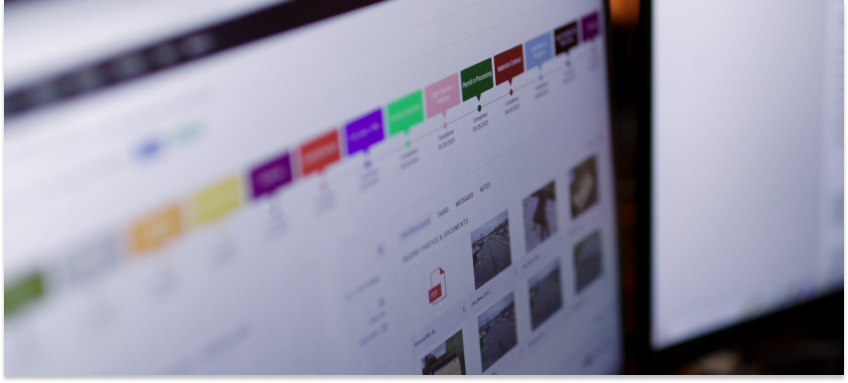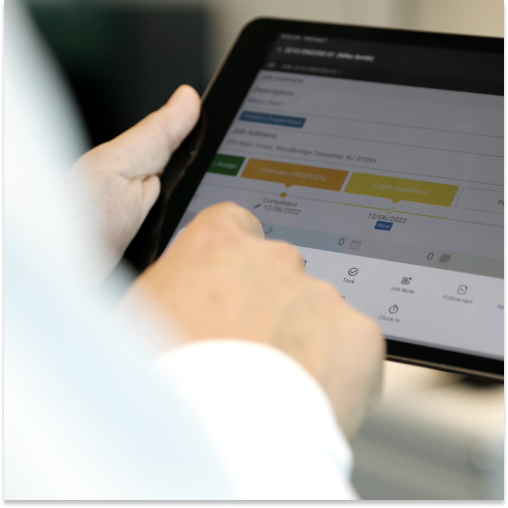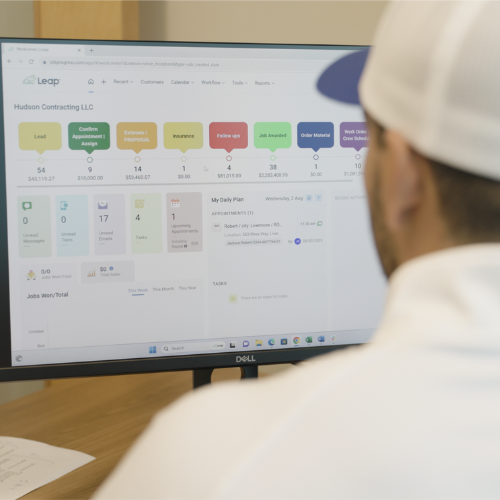As a solar contractor, managing your business efficiently is key to long-term success. However, many solar companies don’t have solar CRM software to manage their leads, daily workflow, and production. In fact, software is fairly new to the industry as many contractors still rely on excel spreadsheets and physical paperwork.
In this ultimate guide, we’ll discuss the best CRMs for solar contractors to grow their business. Moreover, we’ll explore the features, benefits, and pricing of the top CRMs in the solar industry today. So, let’s dive in!
What is Solar CRM Software?
A Customer Relationship Management (CRM) system for solar contractors is a specialized tool designed to help manage leads, customer interactions, sales processes, production, and overall business operations. Specifically, the software will streamline project management, sales, customer service, collaboration, and all reporting.
It’s a centralized platform to track leads, manage customer data, and automate workflows. For example, solar CRM software offers numerous benefits, such as:
- Streamlined Processes: Automates repetitive tasks, freeing up time for more critical activities.
- Improved Customer Service: Centralizes customer information, making it easy to provide personalized service.
- Enhanced Tracking: Helps manage leads and track sales progress, improving conversion rates.
- Better Project Management: Tracks project status, schedules, and resources to ensure every job is complete on time.
- Data-Driven Insights: Provides analytics and reporting to help you make better business decisions.
- Increased Efficiency: Integrates with other tools and software, reducing manual data entry and errors.
No two CRMs are the same. Therefore, it’s important to do your research before investing in software. With that in mind, what features and benefits should yuo be looking for?
Key Features to Consider
The workflow of a solar contractor is quite unique. In general, this is a growing industry that is evolving with better technology and tools. For that reason, you will need a CRM solution that grows alongside your business. In addition, you want to find software that matches your company goals, needs, and budget.
Specifically, the key features you should look for in a solar CRM software include:
- Lead Management
- Digital Estimates, Proposals, and Contracts
- Customizable Workflows
- Customer Service
- Subcontractor Management
- Invoicing and Payments
- Reporting Capabilities
- Partner Integrations
Most CRMs provide the basic features that help you track customer data and communications. Yet, industry-specific CRMs go beyond this with customizable templates for estimating, workflow automation, and partner integrations that can connect you with other tools solar contractors need.
So, what is considered the best CRM for solar contractors? Let’s take a closer look at the top CRMs available to transform your business.
Top 7 CRMs for Solar Contractors
Choosing the right CRM is crucial for your business. And you now know what features to look for. So, here are the best solar CRM software options:
- Leap CRM
- Shape
- Sunbase
- Builder Prime
- Spotio
- Pylon
- Solar CRM
Each of these platforms provides a specific set of features that can greatly benefit your business. Additionally, their costs and customer support vary from one software to the next. As a result, let’s dig into each one a bit further.

1. Leap CRM
Leap CRM is a comprehensive all-in-one solution that provides best-in-class features and management capabilities. It’s a leading solar CRM software with a user-friendly interface and end-to-end management tools from the initial lead to the project completion.
Leap CRM tackles all your operational needs, from lead management and customer communications to task automation and project management. You can schedule appointments, track customer interactions, and generate estimates in just a few clicks. Furthermore, you can turn your estimates into appealing proposals and contracts in seconds.
Pros:
- Customizable workflows tailored to each unique project.
- Detailed reporting and analytics to track performance.
- Customer and subcontractor portals for better collaboration.
- Generate invoices and process payments on the go.
- Access in the office, the field, your truck, or at home via computer, tablet, or mobile device.
- More integrations than most competitors.
Cons:
- Leap CRM comes with such advanced features that there is a learning curve during onboarding.
- It has less extensive sales features, but you can add Leap SalesPro for an additional cost.
Overall, Leap CRM helps solar contractors streamline their processes, improve customer satisfaction, and enhance production efficiency. And better yet, you can get paid faster than ever before.
Leap CRM provides competitive pricing options and is available starting at $79 per month for one user with the Essential plan. The Leap Team plan includes three users starting at $249 per month. You can add more users for $99 per month, per additional user.
2. Shape
Shape is a powerful CRM designed to boost sales and marketing efforts for solar contractors. It’s known for its modern design, functionality, and sales tools to simplify financing.
Pros:
- Manage leads and track referrals.
- Create shared calendars to manage scheduling.
- Proposal tools to send beautiful designs directly to customers.
- A marketing suite with customizable templates
Cons:
- Less extensive project management capabilities with a heavier focus on sales and marketing.
- Utilized more as a point-of-sale and sales tracking software than as a complete management platform.
Shape helps solar contractors manage their leads efficiently whilke improving their sales process. Moreover, it enhances your marketing efforts and includes comprehensive analytics features to measure performance.
Shape’s sales and marketing CRM is available for $119 per month, per user. On the other hand, their lead engine plan is available for $299 per month. Yet, if you just want their point-of-sale capabilities, you can get them for $47 per month, per user.
3. Sunbase
Sunbase is a robust solar CRM software that focuses on leads, sales, and customer service. It performs well with integrated web forms for lead capture, lead assigning, and automated follow-ups.
Pros:
- Track project status and schedules.
- Customer service management to handle inquiries and support requests.
- Capturing, organizing, and managing leads.
- Human resources management for employees.
Cons:
- Outside of customer tracking, there is less extensive project management and production automation.
- Less integration capabilities than some competitors.
Sunbase is a CRM for solar contractors looking for complex features that improve lead management and proposals. You can also consider their design software that provides visually appealing proposals that renders panel layouts.
Unfortunately, Sunbase does not provide transparent pricing information on their website. You will have to book a demo or call the company directly to gain clarity over pricing.
4. Builder Prime
Builder Prime is a versatile CRM designed for contractors, with many features that can help solar businesses. Its features focus on lead management, job scheduling, and project tracking.
Pros:
- Lead management to track and nurture prospects as they come in.
- Project management tools to monitor project status and schedules.
- Job scheduling and task automation capabilities.
Cons:
- Difficult learning curve in comparison to many competitors.
- Less intuitive interface than other CRMs for solar contractors.
- More expensive despite offering a wide range of plans.
Builder Prime provides both lead management and project management. However, it can get pricey for a small business. Its Startup plan is available for $99 per month without much automation and little customer support. The Essentials plan is $199 monthly, while the Growth plan is $299 per month.
5. Spotio
Spotio is a solar CRM software that is designed for field sales to boost sales productivity. It helps you target homes that fit your ideal customer profile to make every sales opportunity count.
Pros:
- Sales productivity features for tracking and task automation.
- Sales prospecting features for lead generation.
- Activity management for communications and reporting.
Cons:
- More of a sales software than a comprehensive CRM.
- Little to no production management capabilities.
Spotio helps solar contractors manage their leads efficiently and improve their conversion rates. The two plans they offer are a B2C plan and a B2B plan. However, you must fill out a form and request a demo to get clear pricing information.
6. Pylon
Pylon is a CRM for solar contractors looking to increase lead flow and quality. It helps you import leads from sources such as Zapier, Facebook Ads, and Google Ads.
Pros:
- Import leads for various sources.
- Connect with customers via two-way SMS and email.
- Kanban-style deal pipeline to manage solar leads.
Cons:
- They provide minimal information about customer support and other features outside of sales.
- It has integrations, though they seem to be minimal.
Pylon helps solar contractors get the most out of their sales pipeline. But it’s not as strong in project management and other valuable features. Though they do offer a free trial, Pylon does not provide pricing information on their website. You will have to book a demo for clarity over pricing.
7. Solar CRM
Solar CRM is a specialized solution designed specifically for the solar industry. It’s known for managing leads, setting up proposals, and managing the sales process.
Pros:
- Create and manage leads within the system.
- Create and manage proposals.
- Track status updates, reminders, and timelines.
Cons:
- Less features and benefits than any other CRM on this list.
- Minimal integrations and less capable of connecting with current systems.
Solar CRM is the least extensive CRM software on this list, but it does earn its spot as a lighter, less complex solution. Pricing information is not clear on the company website, though its G2 profile suggests plans range from $45 per month for five users and up to $195 per month for 50 users.
How to Choose the Right Solar CRM
Choosing the right solar CRM software for your business can be a daunting task. Here are some tips to help you make the right decision:
- Identify Your Needs: Determine what features are essential for your business operations.
- Evaluate Options: Compare different CRMs based on their features, benefits, and pricing.
- Consider Integrations: Ensure that the CRM integrates seamlessly with your existing tools and software.
- Check User Reviews: Read reviews from other contractors to gauge the effectiveness of the CRM.
- Request a Demo: Most CRM providers offer demos. Use this opportunity to see how the CRM works and if it fits your needs.
What works for one business may not work for another. It all comes down to your business goals and current inefficiencies that are holding you back. But one thing is clear, the right CRM will transform your business and give you a competitive advantage in your service area.
How Leap CRM Can Help Solar Contractors
Leap CRM eliminates the painful processes that lead to lost sales, delays, and further inefficiencies that cost your business time and money. In fact, Leap CRM makes it easier for solar contractors to win and manage more jobs.
Customize your workflows and tasks tailored to each specific job. This ensures that your business operations are efficient and streamlined. And use our one-of-a-kind customer and subcontractor portals for better collaboration throughout the process. This ensures smooth project execution and improved customer satisfaction.
Leap also integrates with various tools to improve your operations even further. For example, this includes measurement tools, sales software, financing lenders, imaging technology, and more.
Choosing the right solar CRM software is a big decision that can have a major impact on your success. And Leap understands that too many solar contractors struggle with painful sales and production processes that undermine the great work they do. To see the power of Leap CRM in your hands, fill out the form below and schedule a quick demo! Discover how Leap can help you deliver a customer experience that matches your craftsmanship.
Frequently Asked Questions
Not all CRMs are built to work efficiently for every business depending on how many employees you have and how many jobs you are taking on. Leap CRM can grow alongside your business, whether you’re a neighborhood contractor or a national franchise.
This depends on the customer support and onboarding support of the software solution. The team at Leap will work directly with your staff to ensure you can use all Leap CRM’s features to their maximum potential.
With Leap CRM, you can manage every lead, schedule every appointment, and manage every project efficiently from start to finish. This will prevent common paper errors and give you a centralized database for all your customer interactions and projects.




